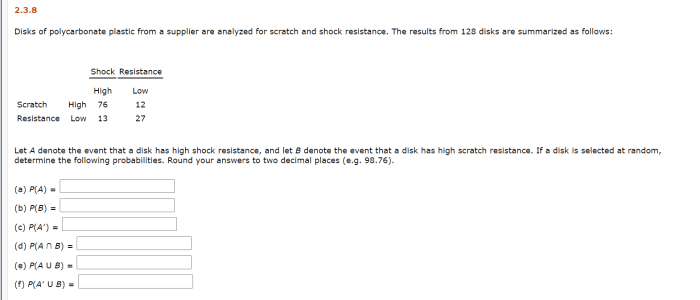Disks of polycarbonate plastic from a supplier are analyzed in this comprehensive overview, exploring their unique physical properties, manufacturing processes, and diverse applications. This analysis provides valuable insights into the characteristics and uses of these versatile materials.
Polycarbonate disks are renowned for their exceptional strength, clarity, and impact resistance, making them ideal for a wide range of industries, including optics, electronics, and medical devices. Their durability and optical clarity contribute to their suitability for demanding applications, ensuring reliable performance and longevity.
Physical Properties of Polycarbonate Disks
Polycarbonate plastic exhibits unique physical properties that make it ideal for a wide range of applications. Its high strength and rigidity ensure durability, while its exceptional clarity allows for precise optical applications. Moreover, polycarbonate’s exceptional impact resistance makes it resistant to shattering and deformation under force.
These properties combine to make polycarbonate disks a versatile material for demanding environments and applications where performance and reliability are paramount.
Manufacturing Process of Polycarbonate Disks
Polycarbonate disks are typically manufactured using one of two methods: injection molding or extrusion. Injection molding involves injecting molten polycarbonate into a mold cavity, where it cools and solidifies into the desired shape. Extrusion, on the other hand, involves forcing molten polycarbonate through a die, creating a continuous profile that is then cut into disks.
The manufacturing process significantly influences the final product’s quality and performance characteristics.
Quality Control and Testing Procedures

To ensure that polycarbonate disks meet industry standards and customer specifications, suppliers implement rigorous quality control measures. These measures include visual inspections, dimensional checks, and performance testing. Thickness, clarity, and surface finish are among the critical parameters evaluated to guarantee the disks’ quality and suitability for their intended applications.
Applications of Polycarbonate Disks

Polycarbonate disks find widespread applications across various industries and domains, including optics, electronics, and medical devices. In optics, they are used as lenses, filters, and protective shields due to their clarity and impact resistance. In electronics, they serve as insulators, spacers, and components in electronic devices.
Additionally, polycarbonate disks are employed in medical devices such as diagnostic equipment, surgical instruments, and implantable devices, owing to their biocompatibility and sterilizability.
Design Considerations for Polycarbonate Disks: Disks Of Polycarbonate Plastic From A Supplier Are Analyzed
When designing polycarbonate disks for specific applications, several factors need to be considered, including size, shape, and surface treatment. The disk’s size and shape should be optimized to meet functional requirements and ensure compatibility with the intended application. Surface treatment options such as anti-scratch coatings, anti-reflective coatings, and UV protection coatings can enhance the disk’s performance and longevity.
Environmental Considerations

Polycarbonate disks are generally considered environmentally friendly due to their recyclability. Recycling programs for polycarbonate are widely available, reducing waste and promoting sustainable practices. However, it is essential to note that the environmental impact of polycarbonate disks also depends on their disposal methods.
Proper disposal techniques should be followed to minimize environmental harm.
FAQ Section
What are the key physical properties of polycarbonate disks?
Polycarbonate disks are characterized by their exceptional strength, clarity, and impact resistance, making them suitable for demanding applications.
How are polycarbonate disks manufactured?
Polycarbonate disks can be produced using various methods, including injection molding and extrusion, each with its own process steps and quality implications.
What quality control measures are implemented for polycarbonate disks?
Suppliers implement quality control measures to ensure disks meet industry standards, including testing for thickness, clarity, and surface finish.
What are the common applications of polycarbonate disks?
Polycarbonate disks are widely used in optics, electronics, and medical devices due to their durability, optical clarity, and ability to withstand harsh environments.
What design considerations should be taken into account for polycarbonate disks?
Factors such as size, shape, and surface treatment should be considered when designing polycarbonate disks to optimize their performance and longevity.